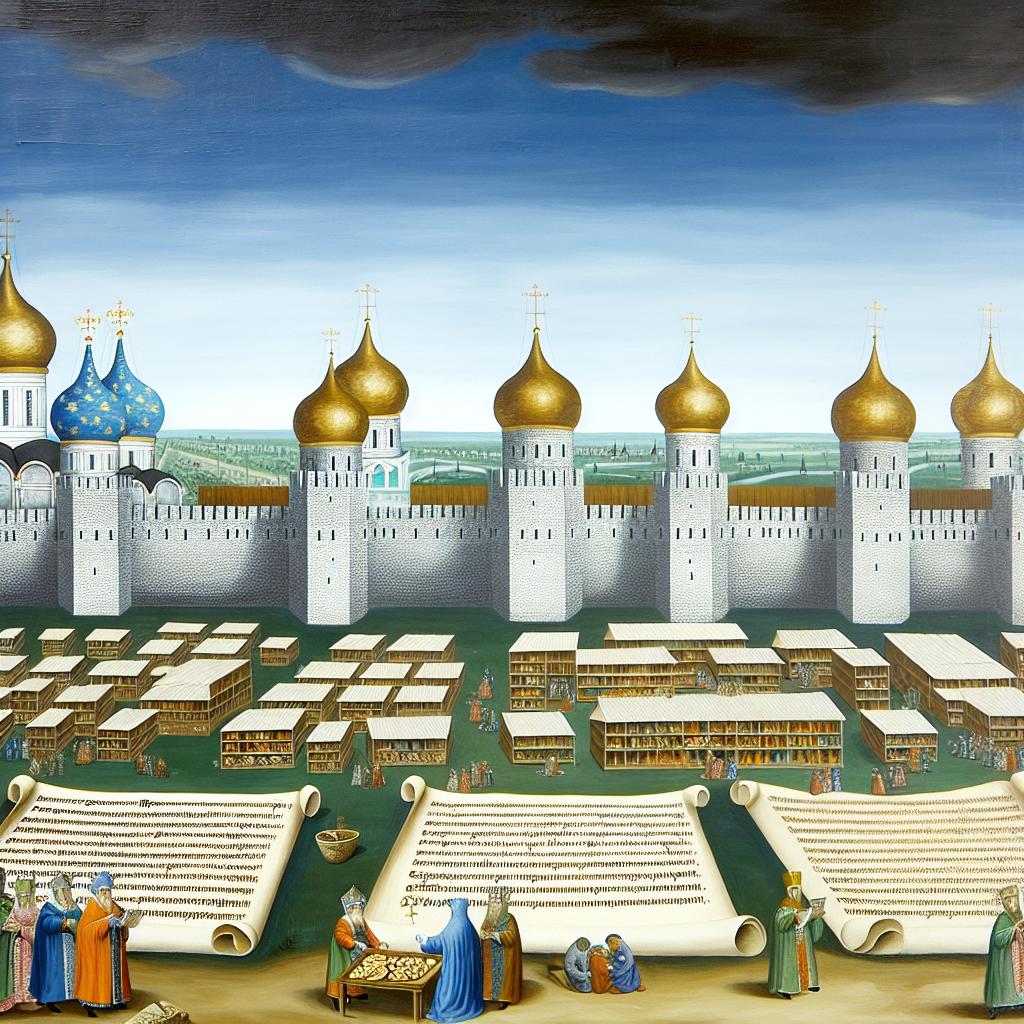The Early Foundations of the Grand Duchy of Moscow
In the northeastern part of Europe, the Grand Duchy of Moscow, often referred to as Muscovy, emerged as a formidable power by the end of the Middle Ages. Initially, it was a minor principality whose rise to prominence was marked by strategic territorial expansion, skillful diplomacy, and effective leadership. The groundwork for its eventual ascent was laid in the late 13th and early 14th centuries, setting the stage for its transformation into a dominant force in the region.
Territorial Expansion and Strategic Location
The city of Moscow, perched on the banks of the Moskva River, benefited immensely from its strategic location. This advantageous setting facilitated trade and defense, allowing it to rapidly grow and become influential among the various Russian principalities. The reign of Daniel of Moscow, the son of Alexander Nevsky, marked the beginning of this territorial expansion, laying the foundations for future growth.
The early expansion of Muscovy involved consolidating lands around Moscow, strengthening its position among other principalities. The city’s growth was not just in size but also in its capacity to influence, thanks to its strategic trade routes and fertile lands that supported a burgeoning economy.
Key Territorial Acquisitions
The process of territorial expansion gained momentum under the leadership of subsequent rulers, notably Ivan I, also known as Ivan Kalita or “Ivan the Moneybag.” Ivan I utilized his position as a tax collector for the Mongol Golden Horde to acquire land and consolidate power. His strategic financial acumen earned him the moniker “Moneybag,” as he amassed wealth through taxation and shrewd management, enabling the expansion and fortification of Moscow’s territories. To explore more about Ivan I’s strategies, further reading can be accessed through resources on historyworld.net.
By acquiring nearby territories, Ivan I leveraged the confluence of trade routes and established a strong financial base for continued expansion. His rule was marked by the successful integration of surrounding regions, enhancing the stability and reach of Muscovy.
Diplomatic Maneuvering and Relations
Moscow’s leaders were adept at diplomatic endeavors, crucially aligning themselves with the powerful Mongol overlords. This pragmatic alliance with the Mongols, who exerted hegemony over much of Russia through the Golden Horde, afforded the Muscovite princes significant political clout and military backing. By ensuring loyalty and cooperation with the Mongols, Moscow secured a degree of autonomy that allowed it to maneuver effectively against competing principalities. This clever diplomacy not only safeguarded Moscow but also poised it for expansion as an emerging power.
The adept handling of Mongol relations allowed Moscow to grow with relatively less interference compared to other regions, smoothing the path for internal consolidation and territorial annexation. This diplomacy was pivotal in maintaining peace and ensuring the sustained growth of the principality.
The Role of the Russian Orthodox Church
A significant aspect of the rise of Moscow was its burgeoning relationship with the Russian Orthodox Church. As the influence of the church expanded, so did Moscow’s importance, eventually assuming the role of the central hub of religious authority in Russia. This spiritual alignment offered Moscow not only legitimacy but also a unifying force that significantly bolstered its political ambitions.
The city’s affiliation with the church acted as a stabilizing and unifying factor, further solidifying Moscow’s preeminence. The church’s power extended into various facets of society, and its support was instrumental in fostering internal cohesion and endorsing the ruling authority of Moscow’s leadership.
Military Strength and Internal Consolidation
The construction of a robust military apparatus was essential to Muscovy’s expansionist agenda. Under the dynamic leadership of Ivan III, the military was reorganized and enhanced, marking an assertion of independence from Mongol influence. Ivan III was instrumental in initiating the development of a centralized Russian state, heralding a new era for the Grand Duchy.
Muscovy’s focus on military advancement was characterized by the recruitment and training of professional soldiers, bolstering the state’s capacity to defend and expand its borders. The era under Ivan III saw significant investments in military technology and strategy, which became foundational for Moscow’s future conflicts.
Centralized Authority
The establishment of autocratic rule under Ivan III enabled a streamlined administration and a reduction in the feudal fragmentation that had plagued the region. By implementing progressive centralization policies, Moscow was able to increase its control over previously semi-independent Russian territories. A structured legal code was developed to consolidate the Grand Duchy’s power, ensuring efficient governance and uniformity across its expanding territories.
Ivan III’s reign was marked by efforts to diminish the power of rival boyars, bringing them under the central authority’s control. This shift towards centralized governance played a critical role in enhancing state stability and promoting cohesive policies across the newly unified regions.
The Emergence of Russia
With effective governance, military strength, and ecclesiastical endorsement, the Grand Duchy of Moscow transformed from a modest principality into the bedrock of the Russian state. Ivan III’s marriage to Sophia Paleologue, the niece of the last Byzantine Emperor, not only symbolically linked Moscow to the legacy of the Byzantine Empire but also bolstered its prestige on the international stage.
This era of transformation was characterized by the consolidation of power and the unification of disparate regions under Moscow’s aegis. The irreversible changes initiated during this period laid the groundwork for future Russian Tsars to further unify and expand the nation, ultimately shaping the course of Russian and Eastern European history.
The legacy of the Grand Duchy of Moscow’s early foundations set the stage for the emergence of a cohesive Russian identity and the establishment of a powerful state. These formative years were instrumental in the trajectory that would lead to Moscow’s dominance and influence in the broader European and Asian landscape.

